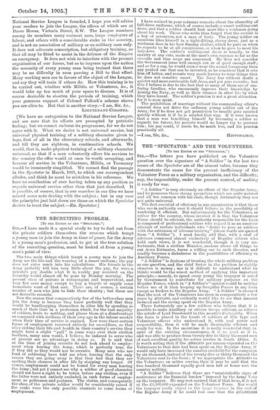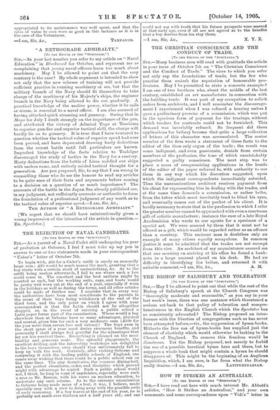STE,—The letters you have published on the Volunteer question over
the signature of "A Soldier" in the last two issues of the Spectator are of the utmost value, because they demonstrate the cause for the present inefficiency of the Volunteer Force as a military organisation, and the difficulty, nay, the impossibility, under the present control, of making it ready for war.
"A Soldier" is very obviously an officer of the Regular Army, and he possesses those strong prejudices which are quite natural and all too common with his class, though fortunately they are not quite universal.
The first essential of efficiency in any organisation is that those who are in authority over it should believe in the possibility of
rendering it efficient. But unfortunately for the Volunteers, or
rather for the country, whose interest it is that the Volunteer Force should be efficient, the authority responsible for the force is composed of professional soldiers who regard it as an amateur attempt of certain individuals who "desire to pose as soldiers with the minimum of irksome training" (these words are quoted from "A Soldier"). I need hardly add that, with a staff of advisers composed almost exclusively of Regular officers who hold such views, it is not wonderful, though it is very un- fortunate, that a civilian Minister, anxious above all things to cut down Estimates, turns a willing ear to such theories, and readily becomes a disbeliever in the possibilities of efficiency in Auxiliary Forces.
"A Soldier" is desirous of treating the whole military problem as one question, and the chief factor in the problem he rightly
observes is money ; nor is it difficult to understand what he thinks would be the wisest method of applying this important principle,—namely, to spend every penny the taxpayer is asked by Government to contribute for military purposes on the
Regular Forces, which in "A Soldier's "opinion would be making better use of it than keepinc, up Irregular Forces in any form except as feeders to the Regular Army. "A Soldier" is alarmed that the cost of the Volunteers has risen in comparatively a few years by £600,000, and evidently would like to see that amount reduced and the saving spent on the Regular Army. There fortunately are a few soldiers who believe that it is possible to make Auxiliary or citizen troops efficient, as witness the article of Lord Dundonald in this month's Fortnightly. When the force is placed in the hands of soldiers of this type and Volunteer officers who understand it, with real power and responsibility, then it will be made thoroughly efficient and ready for war. In the meantime it is really wonderful that, in
spite of the existing circumstances, it is as good as it is, and was able to produce from twenty-five to thirty thousand men of such excellent quality for active service in South Africa. It is worth noting that if the £600,000 per annum expended on the Volunteers to that date had been spent on the Regular Army, it would only have increased the number available for the campaign by six thousand, instead of the twenty-five or thirty thousand the Volunteers sent to the front ; if we appropriate the £600,000 to the Volunteers on active service, then it may be said that the two hundred thousand equally good men left at home cost the country nothing.
"A Soldier" believes that there are "unmistakable signs of restiveness at the financial burden" imposed by the Army Vote
on the taxpayer. He may rest assured that if that be so, it is not at the £1,200,000 expended on the Volunteer Force. Nor would the taxpayer really object to the large increase in the cost of the Regular Army if he could feel sure that the £25,000,000
appropriated to its maintenance was well spent, and that the ratio of value to cost were as good in this instance as it is in the case of the Volunteers.















































 Previous page
Previous page